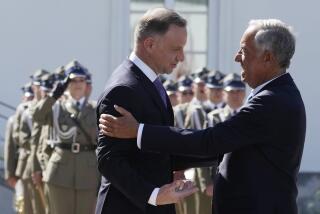The Missiles of Spring
- Share via
Twice in this century Belgium has been occupied by invading armies. If Soviet troops ever move west, they, too, will want Belgium. That gives Brussels a very large stake in collective defenses that are strong enough to keep the Soviet Union from crossing any borders.
The Brussels government has accepted the basing of 48 cruise missiles on Belgian soil as its share in the collective defense. But domestic sentiment against the deployment compels it to stall until the ruling center-right government is safely past next December’s elections.
For Brussels that makes political sense. But the Western allies worry that if Belgium retreats from the deployment schedule agreed on more than five years ago the united front could come unraveled, relieving pressures on the Soviet Union to reduce its own missile force.
The deployment schedule was worked out in 1979 after Western Europe--especially the West Germans--expressed alarm that Soviet deployment of mobile, multiple-warhead SS-20 missiles aimed at Europe were increasing Moscow’s bullying rights in the region. Members of the North Atlantic Treaty Organization agreed that if the Soviet Union could not be persuaded to reduce its force of SS-20s, the Western allies would deploy U.S.-made cruise and ballistic missiles.
The Soviets refused to dismantle any missiles, and U.S.-made Pershing 2 and cruise missiles are being placed in West Germany, Great Britain and Italy. Belgium is committed to accept 48 cruise missiles, with the first 16 due to be deployed in March. The Netherlands would get cruise missiles in 1986.
Belgium’s coalition government is under heavy domestic pressure to cancel or at least to postpone the deployment of its share of the new weapons. But if Belgium backs off from its commitment, the Dutch government--which has similar political problems--would almost certainly do the same. Would public opinion in West Germany then force it to back away from deploying its full quota of Pershing 2s? Washington worries that it would; so, apparently, does the West German government.
In purely military terms the situation might be tolerable, given the existence of the global U.S. nuclear deterrent. But Europe’s self-confidence in standing up to Soviet pressures could suffer. For that reason Britain, West Germany and other allied nations have joined the United States in urging Belgium to stick by the schedule.
Belgian Prime Minister Wilfried Martens is trying to steer a middle course. He says that Belgium is committed to the deployment of cruise missiles, but he suggests that the timing and numbers of the missiles deployed will depend on what happens in negotiations between the United States and the Soviet Union that will start in Geneva in March. That might buy him time to get through the December elections.
In substantive terms it doesn’t matter that much whether the deployment of cruise missiles begins in Belgium in March, as Washington and other allied capitals are urging, or a year from now. But delays become addictive. It is important that Belgium make a firm and credible political commitment now, before U.S. and Soviet negotiators resume Euromissile talks in Geneva.
The question is whether Martens can find a formula that will satisfy both the allies of NATO and public opinion in Belgium. The outlook is not promising.
More to Read
Sign up for Essential California
The most important California stories and recommendations in your inbox every morning.
You may occasionally receive promotional content from the Los Angeles Times.













